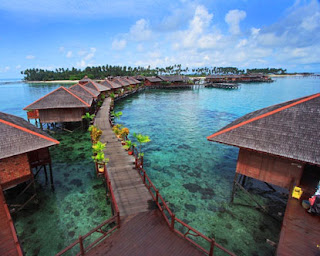Located in East Malaysia with Sarawak, Sabah is Malaysia's second largest state and northernmost province. Its natural attractions entice travelers in search of a different kind of Southeast Asian experience. Those with a taste for adventure will find that Sabah has almost everything. Most visitors head straight for Mount Kinabalu, which is one of the highest mountains in Southeast Asia. Sabah is also legendary among nature lovers. Its lush tropical forests have more than their fair share of unique wildlife. And their easily accessible national parks and reserves ensure that certain animals, such as the rare orang utans can be seen in their natural environment. One can choose to jungle trek, explore caves, try water rafting, visit secluded beaches, dive in remote tropical islands, or visit longhouses to meet their genuine friendly and hospitable people and be intrigued by their traditional lifestyles. Sabah is simple yet sophisticated. It has retained its traditional charms despite keeping up with modernization. Sabah will certainly impress you with its unique and unspoiled character.
Sabah's natural riches have drawn both traders and raiders for centuries. Its history dates back to 1881. Sabah was then known as North Borneo and was administered by the British North Borneo Company. The British continued to rule the colony until 1942 when the Japanese invaded it. However, Britain recaptured the state in 1946 and converted it into a Crown Colony. The British rule ended in 1963 when the state obtained its independence by joining the Federation of Malaysia.
But Sabah's natural wealth still attracts other prospectors. Sabah's proximity with Indonesia and Philippines ensures both nations claim parts of the state as their own. There are close cultural ties with the Philippines although Sabah shares strong Islamic traditions with Peninsula Malaysia.
The Long Houses of Sabah
These long houses, which are built from wood, can accommodate up to 20 families! Activities such as cooking, weaving, and beading are all done in a common place for all residents. Visitors are welcomed to spend a night or two in these houses. Most of these long houses are found among the Rungus tribe near Kudat town.
Tamu
 Tamus are traditional open-air fairs where natives sell a wide variety of local food, agricultural produces, and traditional crafts. Rural Sabahans take this opportunity to peddle their wares for city folks to buy, barter, or trade. Tamus also acts as a social place for community members to meet and chat. It is indeed a colorful 'bazaar' that should not be missed.
Tamus are traditional open-air fairs where natives sell a wide variety of local food, agricultural produces, and traditional crafts. Rural Sabahans take this opportunity to peddle their wares for city folks to buy, barter, or trade. Tamus also acts as a social place for community members to meet and chat. It is indeed a colorful 'bazaar' that should not be missed.\


No comments:
Post a Comment